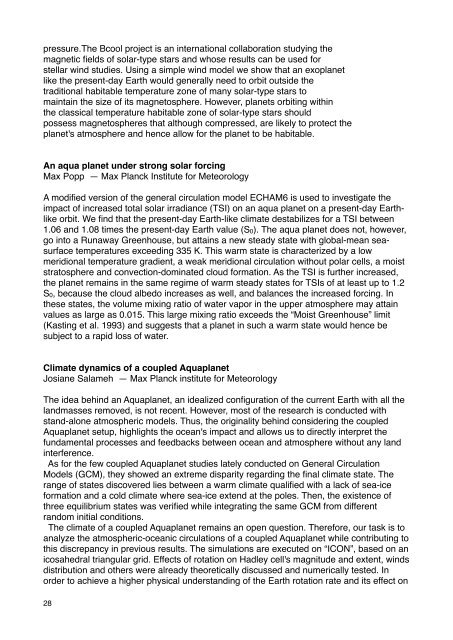Exoclimes_Conference_booklet1
Exoclimes_Conference_booklet1
Exoclimes_Conference_booklet1
You also want an ePaper? Increase the reach of your titles
YUMPU automatically turns print PDFs into web optimized ePapers that Google loves.
pressure.The Bcool project is an international collaboration studying the<br />
magnetic fields of solar-type stars and whose results can be used for<br />
stellar wind studies. Using a simple wind model we show that an exoplanet<br />
like the present-day Earth would generally need to orbit outside the<br />
traditional habitable temperature zone of many solar-type stars to<br />
maintain the size of its magnetosphere. However, planets orbiting within<br />
the classical temperature habitable zone of solar-type stars should<br />
possess magnetospheres that although compressed, are likely to protect the<br />
planet's atmosphere and hence allow for the planet to be habitable.<br />
An aqua planet under strong solar forcing!<br />
Max Popp — Max Planck Institute for Meteorology<br />
A modified version of the general circulation model ECHAM6 is used to investigate the<br />
impact of increased total solar irradiance (TSI) on an aqua planet on a present-day Earthlike<br />
orbit. We find that the present-day Earth-like climate destabilizes for a TSI between<br />
1.06 and 1.08 times the present-day Earth value (S0). The aqua planet does not, however,<br />
go into a Runaway Greenhouse, but attains a new steady state with global-mean seasurface<br />
temperatures exceeding 335 K. This warm state is characterized by a low<br />
meridional temperature gradient, a weak meridional circulation without polar cells, a moist<br />
stratosphere and convection-dominated cloud formation. As the TSI is further increased,<br />
the planet remains in the same regime of warm steady states for TSIs of at least up to 1.2<br />
S0, because the cloud albedo increases as well, and balances the increased forcing. In<br />
these states, the volume mixing ratio of water vapor in the upper atmosphere may attain<br />
values as large as 0.015. This large mixing ratio exceeds the “Moist Greenhouse” limit<br />
(Kasting et al. 1993) and suggests that a planet in such a warm state would hence be<br />
subject to a rapid loss of water.<br />
Climate dynamics of a coupled Aquaplanet<br />
Josiane Salameh — Max Planck institute for Meteorology<br />
The idea behind an Aquaplanet, an idealized configuration of the current Earth with all the<br />
landmasses removed, is not recent. However, most of the research is conducted with<br />
stand-alone atmospheric models. Thus, the originality behind considering the coupled<br />
Aquaplanet setup, highlights the ocean's impact and allows us to directly interpret the<br />
fundamental processes and feedbacks between ocean and atmosphere without any land<br />
interference.<br />
As for the few coupled Aquaplanet studies lately conducted on General Circulation<br />
Models (GCM), they showed an extreme disparity regarding the final climate state. The<br />
range of states discovered lies between a warm climate qualified with a lack of sea-ice<br />
formation and a cold climate where sea-ice extend at the poles. Then, the existence of<br />
three equilibrium states was verified while integrating the same GCM from different<br />
random initial conditions.<br />
The climate of a coupled Aquaplanet remains an open question. Therefore, our task is to<br />
analyze the atmospheric-oceanic circulations of a coupled Aquaplanet while contributing to<br />
this discrepancy in previous results. The simulations are executed on “ICON”, based on an<br />
icosahedral triangular grid. Effects of rotation on Hadley cell's magnitude and extent, winds<br />
distribution and others were already theoretically discussed and numerically tested. In<br />
order to achieve a higher physical understanding of the Earth rotation rate and its effect on<br />
28


